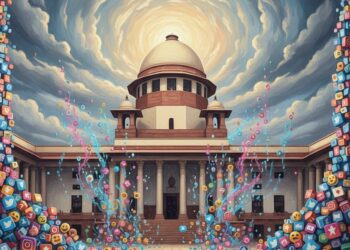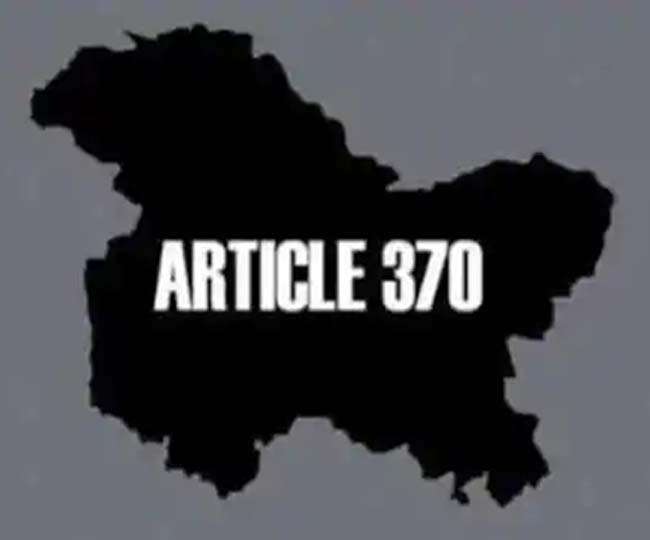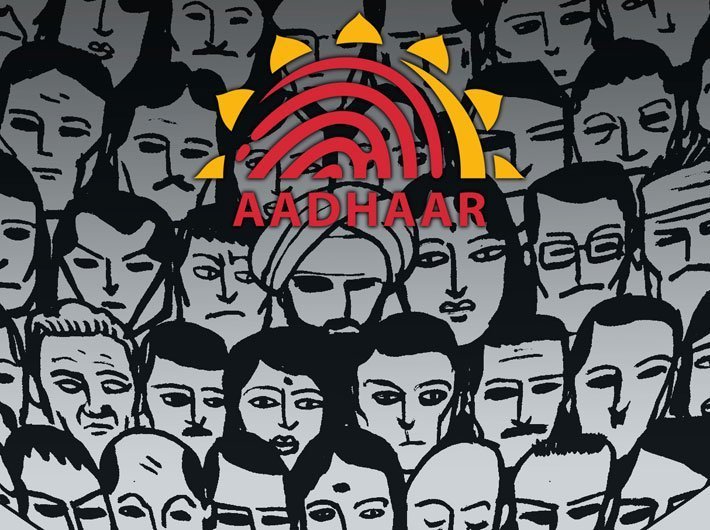First off, in stressing the need for the promotion of ‘constitutional patriotism’, the Supreme Court seems to have presupposed the existence of other kinds of patriotisms and to have also underscored the preferability of ‘constitutional patriotism’ to the other kinds, even if the apex court did not go as far as to deride or denounce the way ‘nationalism’ and ‘patriotism’ is being used as a stick to beat people into submission to the popular will, or, rather, to something that is regularly paraded as the ‘popular will’. However, it is the desirability and the constitutionality of the enforcement of nationalism or patriotism of any kind that the court might have erred in analyzing.
In its order dated November 30, 2016 in the matter of Shyam Narayan Chouksey v. Union of India, the Supreme Court went beyond enforcing the constitutionally mandated duty cast upon every citizen of the country to show due respect to the National Anthem when it is played, recited or sung, and directed that “all cinema halls in India shall play the National Anthem before the feature film starts and all present in the hall are obliged to stand up to show respect to the National Anthem.”
Briefly touching upon the reasoning behind the order, the Supreme Court said, “The directions are issued, for love and respect for the motherland is reflected when one shows respect to the National Anthem as well as to the National Flag. That apart, it would instill the feeling within one, a sense committed patriotism and nationalism.”
In support of its order, the court cited Article 51 A, which mandates as one of the Fundamental Duties that “It shall be the duty of every citizen of India – (a) to abide by the Constitution and respect its ideals and institutions, the National Flag and the National Anthem,” and the Court further added, “the citizens of the country must realize that they live in a nation and are duty bound to show respect to National Anthem which is the symbol of the Constitutional Patriotism and inherent national quality. It does not allow any different notion or the perception of individual rights, that have individually thought of have no space. The idea is constitutionally impermissible.”
The order directs all cinema halls across the country to play National Anthem before the beginning of each show. However, the order is completely silent on why the cinema halls were singled out as the preferred venues for the enforcement of ‘Constitutional Patriotism’. The connection between the promotion of “committed patriotism and nationalism” and the mandatory requirement for the cinema halls to play National Anthem has not been adequately made, the connection not being quite as natural or obvious as the Supreme Court seems to have taken it to be.
Furthermore, the court seems to have ignored the fact that it is one thing for cinema halls to play the National Anthem, and quite another for them to be legally obliged to do the same, and yet another to be mandated by a judicial fiat to do so. And it is in the rather obvious distinctions among the three that a very complex interplay of desirability, legality and constitutionality of the enforcement of the concepts like nationalism and patriotism operates. The general and generally inviolable principle of legal and constitutional propriety is that no matter how desirable a result might be, it cannot be allowed to be achieved by extralegal or extra-constitutional methods, and at the very heart of the Indian Constitution sits the Doctrine of the Separation of Powers, which is part of its Basic Structure, and for that reason cannot be touched to its detriment even by a constitutional amendment.
The Doctrine of the Separation of Powers, as enunciated by several constitutional benches of the Supreme Court of India, places policy decisions in the exclusive domain of the Executive, and the only policy that the courts can lay down is what is called the ‘judicial policy’, which is not very different from the guiding principles of interpretation governing the preference of one alternative to the others in terms of statutory and/or constitutional interpretation.
 Courts look into the legality and constitutionality of the acts undertaken by the individuals, governments and legislatures whereas the appropriateness, desirability and public good are the concern of the legislative and executive branches of the state, and there is a very good reason for this very clear cut segregation of functions.
Courts look into the legality and constitutionality of the acts undertaken by the individuals, governments and legislatures whereas the appropriateness, desirability and public good are the concern of the legislative and executive branches of the state, and there is a very good reason for this very clear cut segregation of functions.
The policy decisions are outside the judicial domain for the simple reason that it is the Judiciary that has to sit in judgment over the legality and constitutionality of the policy decisions, which is consistent with the System of Checks and Balances we have in place as the operational core of the Doctrine of the Separation of Powers. If the courts take a policy decision, it is only the higher courts that can go into the legality of such decisions in appeal, which is contrary to the concept of institutional checks and balances that the Indian Constitution gives effect to unequivocally, and that makes judicial policy making inconsistent with the spirit of the Separation of Powers embedded in the Constitution of India because in judicial policy making, it is only the Judiciary that is involved in both determining the policy and pronouncing on the legality of such policy. It gets more complicated if the policy decision is taken by a High Court because then it is only the Supreme Court that can look into the legality of it, and it is worst when the policy decision is taken by the Supreme Court itself because then there is no higher court left to approach against the decision in appeal.
Both the judicial mechanism of appeals and the institutional checks and balances are aimed at ensuring an impartial review of decisions — judicial, executive and legislative — and form a crucial cornerstone of any polity founded upon the ideas of justice and fairness. The institutional boundaries must be treated as sacrosanct and must be breached, particularly by the Judiciary, only in such cases of dire need where any of the fundamental rights — individual or collective, directly or indirectly — is in such serious jeopardy as to call for urgent judicial intervention. The Judiciary must be extremely careful as to not overstep the institutional boundaries because among all the three branches of the state, it is the one that can do it most easily, and every single breach strains the polity and threatens the constitutional balance by striking at the foundational principles of justice and fairness.
It is not hard to ascertain what is a policy decision because any decision that is not by its very nature a judicial decision is essentially a policy decision. The exclusive judicial function is the adjudication of disputes involving determination and enforcement of the individual or collective rights of the people in accordance with the law in force on case to case basis whereas policy decisions are taken for the welfare of the people or for the realization of the collective aspirations of the nation in the light of the Directive Principles of Sate Policy and the Preamble to the Constitution.
To put it in the perspective of the issue in hand, the decision as to what constitutes due respect to the National Anthem in keeping with spirit of Article 51 A of the Constitution could be taken by the Legislature or the Executive and the same could then be called into question before the constitutional courts, which is when the court could either sustain the decision or strike it down, and that would be the proper time for the court to pronounce upon the issue.
However, in the case the Supreme Court passed the National Anthem order, the apex court was petitioned under Article 32 to exercise its extraordinary writ jurisdiction for the enforcement of Fundamental Duties under Part IVA of the Constitution and the Prevention of Insults to National Honour Act, 1971, which is impermissible under the constitutional scheme because Article 32 can be invoked only and exclusively for the enforcement of the Fundamental Rights guaranteed under Part III of the Constitution whereas Part IVA A of the constitution is not judicially enforceable in the first place. Fundamental Duties, like Directive Principles of State Policy, can be enforced only through appropriate enactments by the Legislature and those laws are judicially enforceable in such — and only such — manner as the enforcing enactment provides. Therefore, enforcing Article 51 A by an order or writ under Article 32 is patently ultra vires. In fact, a petition for the enforcement of Fundamental Duties, or, for that matter, Directive Principles of State Policy is not maintainable anyway, as Part IVA and Part IVA of the Constitution are not justiceable, which is a more than well settled proposition of constitutional law in India. As for Part IVA, Article 37 closes the issue by mandating in clear and unambiguous terms that “the provisions contained in this Part shall not be enforceable by any court, but the principles therein laid down are nevertheless fundamental in the governance of the country and it shall be the duty of the State to apply these principles in making laws.”
That standing up when the National Anthem is sung is sufficient respect to the National Anthem and singing the National Anthem was not required was settled by the Supreme Court in Bijoe Emmanuel v. State Of Kerala, 1987 AIR 748. Notably, the Supreme Court was not called upon to decide what constitutes adequate ‘respect’ to the National Anthem, but if not singing the National Anthem amounted to ‘disrespect’ punishable under Section 3 of the Prevention of Insults to National Honour Act, 1971, and the Supreme Court decided that it does not because the provision states: Whoever intentionally prevents the singing of the Indian National Anthem or causes disturbances to any assembly engaged in such singing shall be punished with imprisonment for a term, which may extend to three years, or with fine, or with both.
In Shyam Narayan Chouksey v. Union of India, AIR 2003 MP 233, the Madhya Pradesh High Court ordered the deletion of a scene involving the depiction of National Anthem in the movie Kabhi Khushi Kabhi Gham on the grounds that since in the middle of the movie the audience would not be in a position to show due respect to the National Anthem, it resulted in an unintentional disrespect to the Anthem and for that reason the movie could not include the sequence in question. However, setting aside the judgment of the Madhya Pradesh High Court in Karan Johar v. Union of India, (2004) 5 SCC 127, the Supreme Court referred to Clause V (1) of the Orders relating to the National Anthem of India issued by the Government of India, which states: Whenever the Anthem is sung or played, the audience shall stand to attention. However, when in the course of newsreel or documentary the Anthem is played as a part of the film, it is not expected of the audience to stand as standing is bound to interrupt the exhibition of the film and would create disorder and confusion rather than add to the dignity of the Anthem.
 In both the leading cases referred to above, the Supreme Court looked into the question of citizens’ Fundamental Rights guaranteed by Part III of the Constitution vis-a-vis the duty to show respect to the National Anthem as mandated by the law. However, what constitutes due respect and how it must be shown was treated as necessarily a policy decision to be taken by the Legislature, or, in absence of a legislative enactment, by the Executive in exercise of the executive power conferred upon it by the constitution, which is why in the Bijoe Emmanuel case it was the Prevention of Insults to National Honour Act, 1971 and in the Karan Johar case an Order by the Government of India was made the basis for the judicial determination of the issue though the enforcement of the statute or the government order was not the primary objective of the Supreme Court’s decision. In fact, in both the cases the concern of the court was the Fundamental Rights of the citizens and not the enforcement of the Fundamental Duties, which is what distinguishes the recent National Anthem order from the past judicial pronouncements of the apex court on the issue in question.
In both the leading cases referred to above, the Supreme Court looked into the question of citizens’ Fundamental Rights guaranteed by Part III of the Constitution vis-a-vis the duty to show respect to the National Anthem as mandated by the law. However, what constitutes due respect and how it must be shown was treated as necessarily a policy decision to be taken by the Legislature, or, in absence of a legislative enactment, by the Executive in exercise of the executive power conferred upon it by the constitution, which is why in the Bijoe Emmanuel case it was the Prevention of Insults to National Honour Act, 1971 and in the Karan Johar case an Order by the Government of India was made the basis for the judicial determination of the issue though the enforcement of the statute or the government order was not the primary objective of the Supreme Court’s decision. In fact, in both the cases the concern of the court was the Fundamental Rights of the citizens and not the enforcement of the Fundamental Duties, which is what distinguishes the recent National Anthem order from the past judicial pronouncements of the apex court on the issue in question.
After ruling that standing up when the National Anthem is played is mandatory under the law, which is consistent with the governmental orders and the past judicial pronouncements, the Supreme Court abruptly and apparently of its own accord directs that all cinema halls must play the National Anthem before the motion picture starts without explaining the reason for its singling out the cinema halls. It does explain to some extent why National Anthem must be played and what it does when people stand together as the National Anthem is played, but the order is completely silent on why and how cinema halls fall in a class as exclusive for the purpose as to warrant a specific direction in this regard. In this respect the order is hardly a ‘speaking order’, and non-speaking orders are generally considered weak orders susceptible to reversals, and since the Supreme Court has created an exclusive class for the purpose of the enforcement of law, it is not open for the court to not set out the reasons and grounds for doing the same because Article 14 demands that a classification for the enforcement of any law must necessarily be a valid classification otherwise it ends up being an arbitrary and unreasonable classification inviting invalidation under Article 14 of the Constitution.
Had the Legislature or the Executive singled out the cinema halls for the purpose of playing the National Anthem, such order, quite understandably, would have been liable to a very sustainable challenge for the violation of Article 14, as there is little that cinema halls have which other kinds and forms of public gatherings do not have for the purpose of playing the National Anthem. Surprisingly, in the National Anthem order, the Supreme Court, after holding that the National Anthem shall “never be displayed in such a manner at such places which may be disgraceful to its status and tantamount to disrespect”, goes on the direct the cinema halls to play it without explaining how are cinema halls, being out-and-out commercial establishments meant for pure entertainment, are places befitting the National Anthem. Quite clearly, the objective of the Supreme Court order is not to ‘popularize’ the National Anthem or ‘spreading awareness’ about the nationalistic and patriotic significance of it. Playing the National Anthem over and over again a thousand times every day lowers the dignity of the National Anthem apart from exposing it to potential disrespect every day a thousand times. It’s not an advertisement jingle; it’s our National Anthem and must be played at special occasions in a dignified fashion.
Furthermore, the connection between National Anthem and “a sense of committed patriotism and nationalism” that the Supreme Court made and based its order on is way too far-fetched to serve as a rational ground for the order handed down by the apex court. Apparently, the apex court got it backwards. People are respectful to the National Anthem due to a sense of patriotism and nationalism, and not the other way round. Display of respect — particularly when one is forced to show respect — to the National Anthem does not — and cannot — generate a sense of patriotism or nationalism. All it can generate is anger and resentment in people at being forced to prove their patriotism at the beginning of every movie. With due respect to the Hon’ble Supreme Court, nation-building by anthem-singing doesn’t sound like an awfully rational course to take. Besides, nation-building is the job of the political leaders. Courts have nothing to do with it, and so it should be.
Originally written for LAWYERS UPDATE. However, the Editorial Board at LU found the criticism a little too sharp and decided against publishing it.







